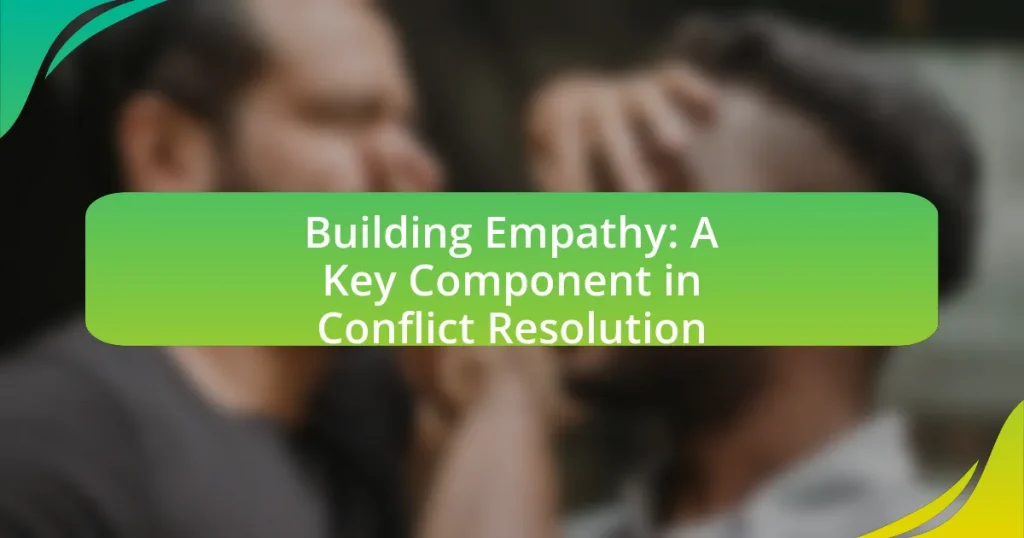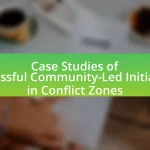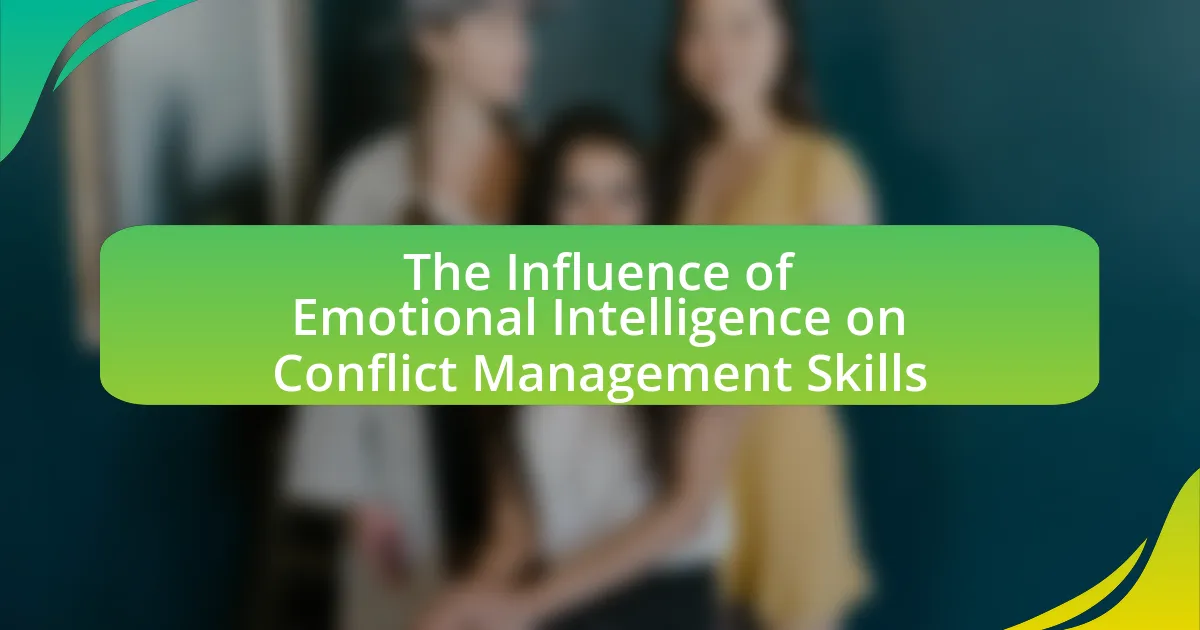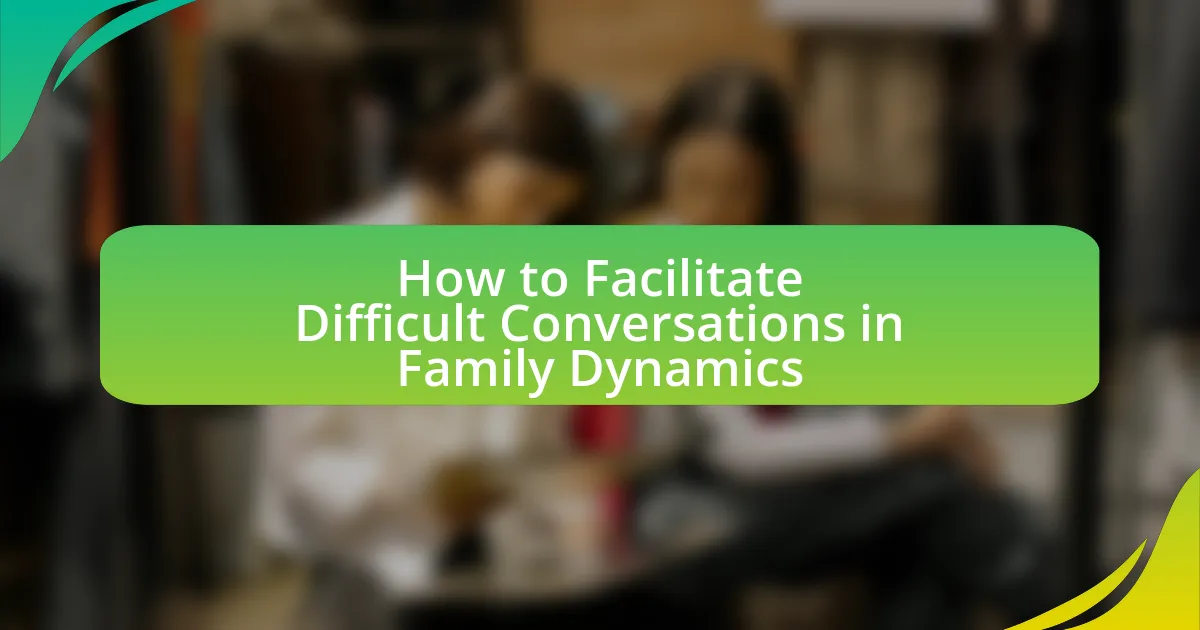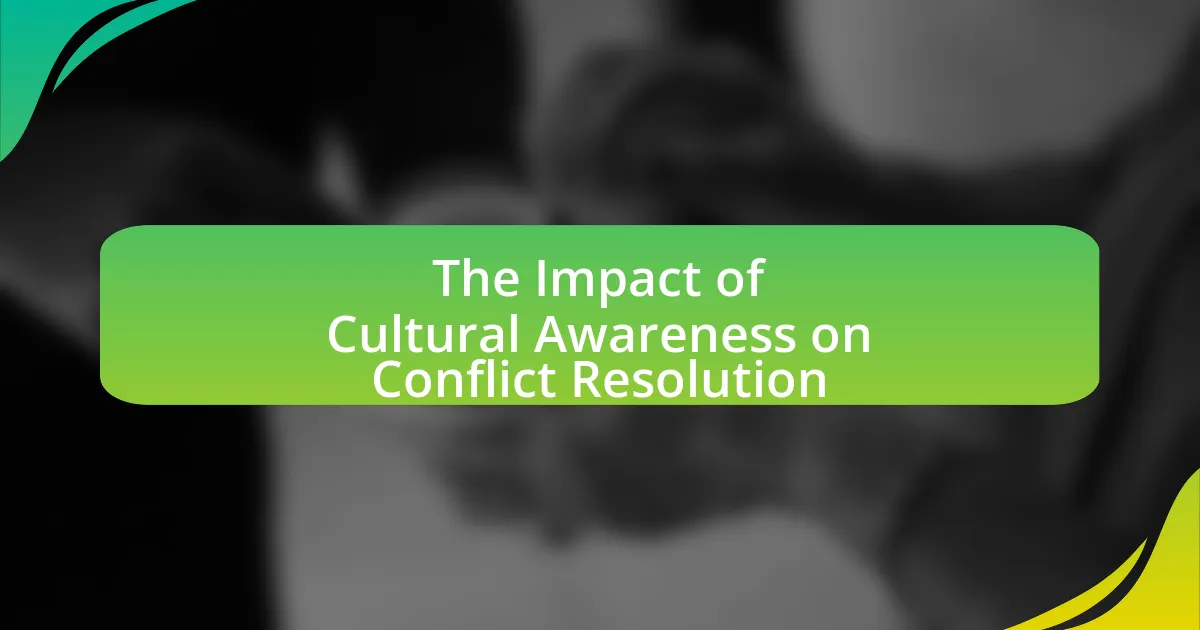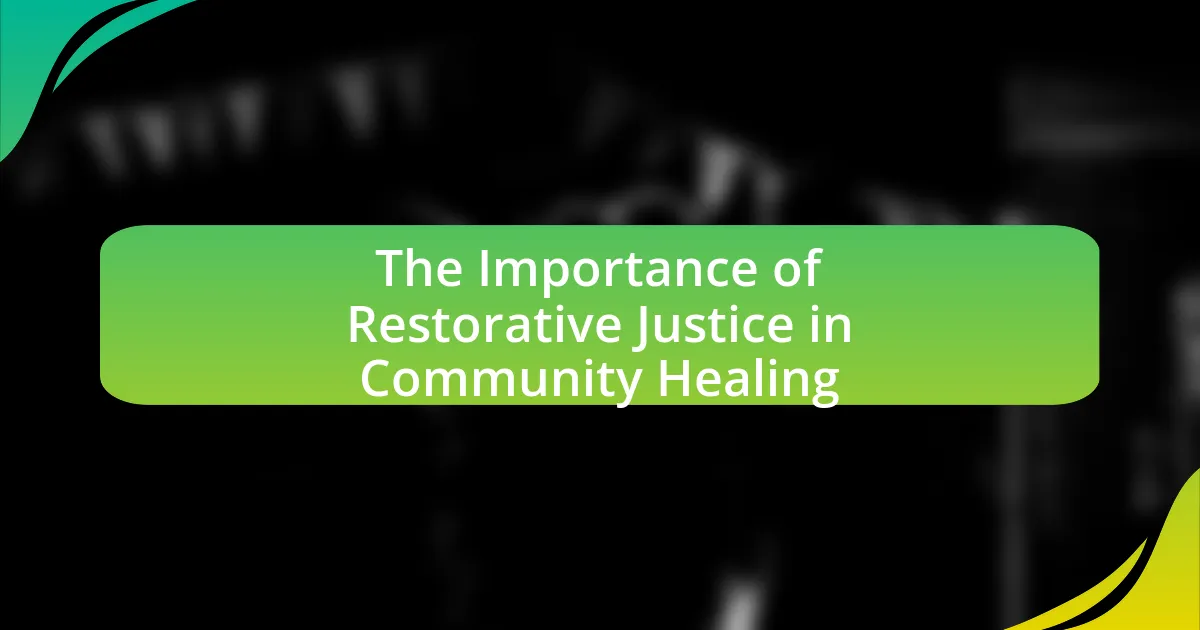The article focuses on the critical role of empathy in conflict resolution, defining it as the ability to understand and share the feelings of others involved in disputes. It highlights how empathy fosters constructive dialogue, enhances communication, and promotes cooperation, ultimately leading to more effective problem-solving. Key elements such as active listening, emotional understanding, and perspective-taking are discussed, along with the different types of empathy—cognitive, emotional, and compassionate—that contribute to successful conflict resolution. The article also addresses challenges in building empathy, strategies to overcome these barriers, and best practices for maintaining empathy throughout the resolution process.
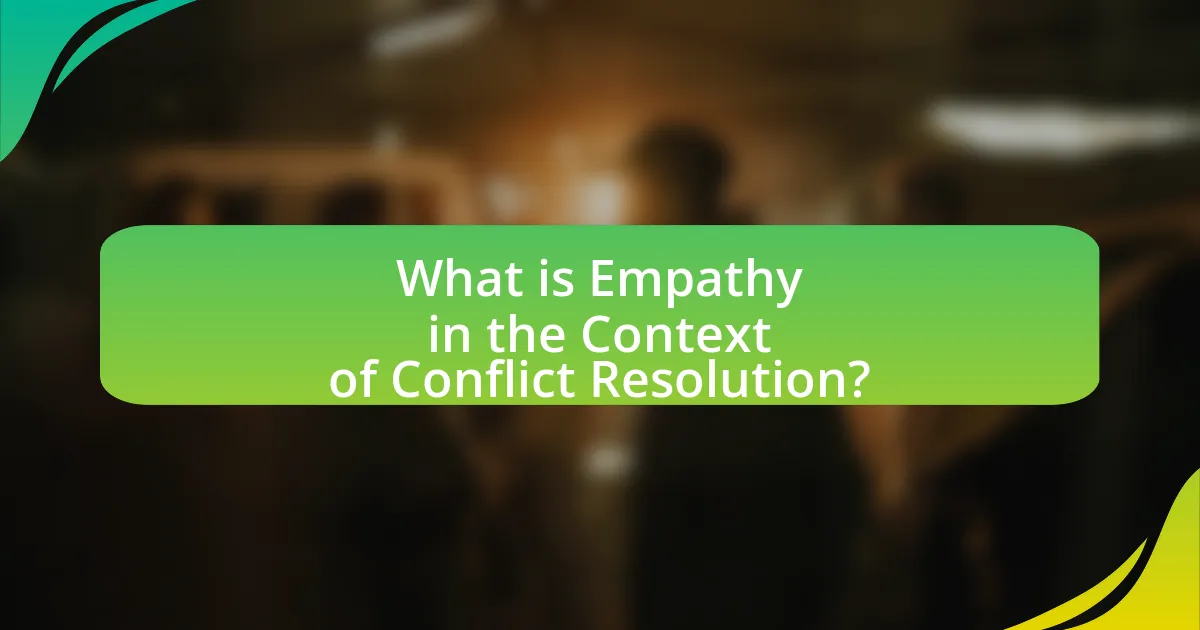
What is Empathy in the Context of Conflict Resolution?
Empathy in the context of conflict resolution is the ability to understand and share the feelings of others involved in a dispute. This understanding fosters a more constructive dialogue, allowing parties to recognize each other’s perspectives and emotions, which can lead to more effective problem-solving. Research indicates that empathy can significantly reduce hostility and promote cooperation; for instance, a study published in the Journal of Conflict Resolution found that empathetic engagement can lead to a 50% increase in successful negotiation outcomes. By facilitating emotional connection, empathy serves as a crucial tool in transforming conflicts into opportunities for collaboration and mutual understanding.
How does empathy influence conflict resolution processes?
Empathy significantly enhances conflict resolution processes by fostering understanding and cooperation among conflicting parties. When individuals practice empathy, they are better able to recognize and appreciate the perspectives and emotions of others, which can lead to more effective communication and problem-solving. Research indicates that empathetic engagement can reduce hostility and promote collaborative dialogue, ultimately facilitating a more constructive resolution. For instance, a study published in the Journal of Conflict Resolution found that empathy training improved negotiation outcomes by increasing mutual understanding and decreasing adversarial attitudes. This evidence underscores the critical role empathy plays in transforming conflicts into opportunities for resolution and growth.
What are the key elements of empathy that aid in resolving conflicts?
The key elements of empathy that aid in resolving conflicts include active listening, emotional understanding, and perspective-taking. Active listening allows individuals to fully comprehend the concerns and feelings of others, fostering an environment of respect and validation. Emotional understanding involves recognizing and acknowledging the emotions of all parties involved, which can diffuse tension and promote a sense of connection. Perspective-taking enables individuals to see the situation from another’s viewpoint, facilitating compromise and collaborative problem-solving. Research indicates that these elements significantly enhance communication and reduce hostility, leading to more effective conflict resolution.
How does understanding emotions contribute to effective conflict resolution?
Understanding emotions significantly enhances effective conflict resolution by enabling individuals to identify and address the underlying feelings that drive disputes. When parties recognize their own emotions and those of others, they can communicate more openly and empathetically, which fosters a collaborative environment. Research indicates that emotional intelligence, which includes the ability to understand and manage emotions, is linked to better conflict resolution outcomes. For instance, a study published in the Journal of Organizational Behavior found that teams with higher emotional intelligence demonstrated improved conflict management skills, leading to more constructive resolutions. This evidence underscores the importance of emotional awareness in navigating conflicts successfully.
Why is empathy considered a vital skill in conflict resolution?
Empathy is considered a vital skill in conflict resolution because it enables individuals to understand and share the feelings of others, fostering effective communication and collaboration. When parties involved in a conflict practice empathy, they can better recognize each other’s perspectives and emotions, which helps to de-escalate tensions and promote mutual respect. Research indicates that empathetic engagement can lead to more constructive dialogue and problem-solving, as it encourages individuals to find common ground rather than focusing solely on their own positions. For instance, a study published in the Journal of Conflict Resolution found that empathy significantly reduces hostility and increases the likelihood of reaching a satisfactory agreement.
What role does empathy play in fostering communication during conflicts?
Empathy plays a crucial role in fostering communication during conflicts by enabling individuals to understand and share the feelings of others, which facilitates more constructive dialogue. When parties involved in a conflict practice empathy, they are more likely to listen actively and validate each other’s perspectives, reducing hostility and promoting collaboration. Research indicates that empathetic communication can lead to better conflict resolution outcomes, as it encourages openness and reduces defensiveness, allowing for a more effective exchange of ideas and solutions.
How can empathy reduce hostility and promote collaboration?
Empathy can reduce hostility and promote collaboration by fostering understanding and connection between individuals. When people practice empathy, they are more likely to recognize and validate the emotions and perspectives of others, which can diminish feelings of anger or resentment. Research indicates that empathetic communication leads to more constructive dialogue, as seen in a study published in the Journal of Personality and Social Psychology, where participants who engaged in empathetic listening reported lower levels of conflict and increased willingness to cooperate. This ability to relate to others’ experiences creates a foundation for collaborative problem-solving, ultimately enhancing group cohesion and productivity.
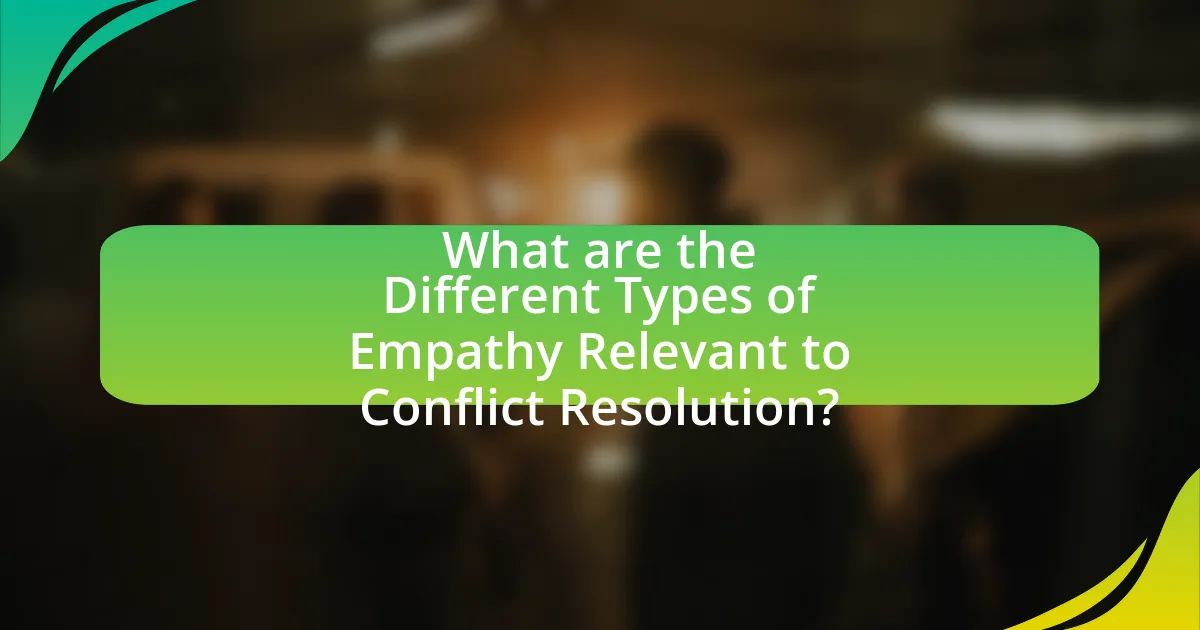
What are the Different Types of Empathy Relevant to Conflict Resolution?
The different types of empathy relevant to conflict resolution are cognitive empathy, emotional empathy, and compassionate empathy. Cognitive empathy involves understanding another person’s perspective and thoughts, which aids in recognizing the underlying issues in a conflict. Emotional empathy allows individuals to feel the emotions of others, fostering a deeper connection and understanding of their feelings. Compassionate empathy goes a step further by not only understanding and feeling but also taking action to help alleviate the other person’s distress. Research indicates that these types of empathy can significantly enhance communication and collaboration during conflicts, leading to more effective resolutions.
How do cognitive and emotional empathy differ in conflict situations?
Cognitive empathy and emotional empathy differ significantly in conflict situations. Cognitive empathy involves understanding another person’s perspective and thoughts, allowing individuals to analyze the situation logically and identify potential solutions. In contrast, emotional empathy entails sharing and feeling the emotions of others, which can lead to a deeper emotional connection but may also cloud judgment and escalate tensions. Research indicates that while cognitive empathy can facilitate effective communication and problem-solving, emotional empathy can sometimes hinder resolution by intensifying feelings of distress or anger.
What impact does cognitive empathy have on understanding opposing viewpoints?
Cognitive empathy significantly enhances the understanding of opposing viewpoints by allowing individuals to recognize and comprehend the thoughts and feelings of others. This understanding fosters open dialogue and reduces hostility, as individuals are better equipped to appreciate differing perspectives. Research indicates that cognitive empathy can lead to more constructive conversations, as it encourages active listening and validation of others’ experiences, which are crucial in conflict resolution scenarios. For instance, a study published in the journal “Personality and Social Psychology Bulletin” by authors Batson et al. (1997) demonstrated that individuals who practiced cognitive empathy were more likely to engage in prosocial behavior and resolve conflicts amicably.
How does emotional empathy facilitate connection and trust among conflicting parties?
Emotional empathy facilitates connection and trust among conflicting parties by allowing individuals to understand and share the feelings of others, which fosters a sense of belonging and mutual respect. When parties in conflict engage in emotional empathy, they are more likely to perceive each other as human beings with valid emotions and experiences, rather than as adversaries. Research indicates that emotional empathy can lead to increased cooperation and reduced hostility, as individuals feel more connected to one another. For instance, a study published in the journal “Emotion” by researchers at the University of California found that individuals who practiced emotional empathy were more likely to resolve conflicts amicably and build trust, as they could better appreciate the perspectives and emotions of others involved in the dispute.
What are some practical applications of empathy in conflict resolution?
Empathy can be practically applied in conflict resolution through active listening, perspective-taking, and emotional validation. Active listening involves fully concentrating on the speaker, which fosters understanding and reduces defensiveness. Perspective-taking allows individuals to see the situation from the other party’s viewpoint, promoting mutual respect and collaboration. Emotional validation acknowledges the feelings of others, which can de-escalate tensions and create a safe environment for dialogue. Research shows that these empathetic approaches lead to more effective conflict resolution outcomes, as they facilitate open communication and foster a sense of connection between conflicting parties.
How can active listening enhance empathetic responses in conflicts?
Active listening enhances empathetic responses in conflicts by allowing individuals to fully understand and acknowledge the feelings and perspectives of others. This process involves paying close attention, reflecting back what is heard, and validating emotions, which fosters a deeper connection and reduces misunderstandings. Research indicates that when individuals engage in active listening, they are more likely to respond with empathy, as they have taken the time to comprehend the other person’s viewpoint. For instance, a study published in the Journal of Conflict Resolution found that active listening significantly improved relational satisfaction and conflict resolution outcomes, demonstrating its effectiveness in promoting empathy during disputes.
What techniques can be used to cultivate empathy in conflict resolution scenarios?
Techniques to cultivate empathy in conflict resolution scenarios include active listening, perspective-taking, and emotional validation. Active listening involves fully concentrating on the speaker, understanding their message, and responding thoughtfully, which fosters a deeper connection and understanding. Perspective-taking requires individuals to consider the situation from the other person’s viewpoint, enhancing awareness of their feelings and motivations. Emotional validation acknowledges and accepts the emotions expressed by others, which can reduce defensiveness and promote openness. Research indicates that these techniques can significantly improve communication and reduce hostility, leading to more effective conflict resolution outcomes.
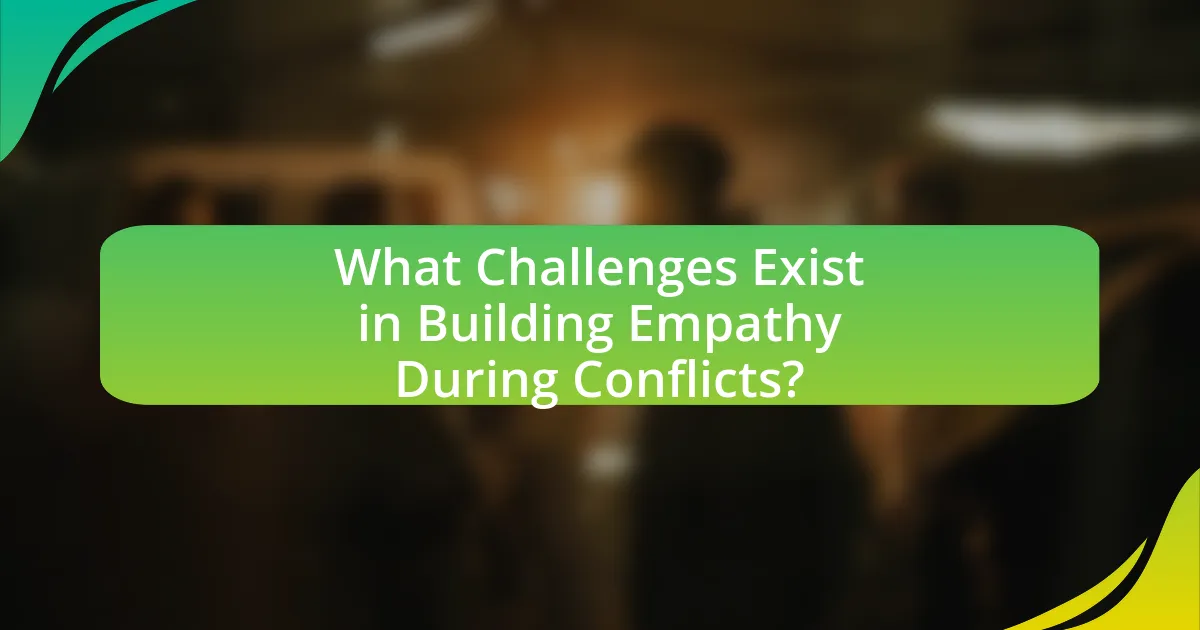
What Challenges Exist in Building Empathy During Conflicts?
Building empathy during conflicts is challenged by emotional barriers, cognitive biases, and communication breakdowns. Emotional barriers, such as anger or fear, can hinder individuals from understanding opposing perspectives. Cognitive biases, like confirmation bias, lead people to favor information that supports their views while dismissing contrary evidence. Additionally, communication breakdowns, often exacerbated by misunderstandings or lack of active listening, prevent effective dialogue. Research indicates that these factors significantly impede the ability to foster empathy, as demonstrated in studies on conflict resolution where emotional intelligence and active listening were found to be crucial for overcoming these challenges.
What barriers prevent individuals from practicing empathy in conflicts?
Barriers that prevent individuals from practicing empathy in conflicts include emotional reactivity, cognitive biases, and social pressures. Emotional reactivity can lead to defensive responses, hindering the ability to understand others’ perspectives. Cognitive biases, such as confirmation bias, cause individuals to favor information that supports their own views while dismissing opposing viewpoints. Social pressures, including groupthink or fear of judgment, can discourage individuals from expressing empathy, as they may prioritize conformity over understanding. Research indicates that these barriers significantly impact conflict resolution, as individuals often struggle to engage empathetically when faced with strong emotions or societal expectations.
How do personal biases and emotions hinder empathetic engagement?
Personal biases and emotions hinder empathetic engagement by distorting perceptions and reactions to others’ experiences. When individuals hold preconceived notions or emotional responses, they may misinterpret or dismiss the feelings and perspectives of others, leading to a lack of genuine understanding. Research indicates that biases, such as stereotypes, can create barriers to empathy by causing individuals to focus on differences rather than commonalities, ultimately reducing the ability to connect with others on an emotional level. For instance, a study published in the journal “Emotion” by researchers at the University of California found that individuals who are emotionally charged are less likely to accurately perceive the emotions of others, which directly impacts their capacity for empathy.
What strategies can be employed to overcome these barriers?
To overcome barriers in building empathy for conflict resolution, active listening and perspective-taking are essential strategies. Active listening involves fully concentrating on the speaker, understanding their message, and responding thoughtfully, which fosters a deeper connection and understanding. Perspective-taking requires individuals to consciously consider the feelings and viewpoints of others, promoting empathy and reducing misunderstandings. Research by Decety and Jackson (2004) in “The Functional Architecture of Empathy” highlights that these strategies enhance emotional understanding and facilitate conflict resolution by bridging gaps between differing perspectives.
How can individuals develop their empathetic skills for better conflict resolution?
Individuals can develop their empathetic skills for better conflict resolution by actively practicing active listening and engaging in perspective-taking. Active listening involves fully concentrating on the speaker, understanding their message, and responding thoughtfully, which fosters a deeper connection and understanding of their emotions. Engaging in perspective-taking allows individuals to consider situations from others’ viewpoints, enhancing their ability to relate to different experiences and feelings. Research indicates that empathy can be cultivated through training programs that focus on these skills, leading to improved interpersonal relationships and more effective conflict resolution strategies. For instance, a study published in the Journal of Conflict Resolution found that participants who underwent empathy training demonstrated significant improvements in their ability to resolve conflicts amicably.
What role does self-awareness play in enhancing empathy?
Self-awareness significantly enhances empathy by enabling individuals to recognize and understand their own emotions, thoughts, and biases. This understanding allows a person to better relate to the feelings and perspectives of others, fostering deeper connections and compassion. Research indicates that self-aware individuals are more likely to engage in perspective-taking, which is a critical component of empathetic behavior. For instance, a study published in the Journal of Personality and Social Psychology found that individuals with higher self-awareness demonstrated greater emotional intelligence and were more adept at empathizing with others’ experiences. This correlation underscores the importance of self-awareness as a foundational element in developing empathy, particularly in contexts such as conflict resolution, where understanding differing viewpoints is essential.
How can training and workshops improve empathetic abilities in conflict resolution?
Training and workshops can significantly enhance empathetic abilities in conflict resolution by providing structured environments for individuals to practice active listening, perspective-taking, and emotional intelligence. These programs often incorporate role-playing scenarios and guided discussions that allow participants to experience conflicts from multiple viewpoints, fostering a deeper understanding of others’ feelings and motivations. Research indicates that experiential learning, such as that found in workshops, can lead to improved interpersonal skills; for instance, a study published in the Journal of Conflict Resolution found that participants who engaged in empathy training demonstrated a 30% increase in their ability to resolve conflicts amicably. This evidence supports the notion that targeted training can effectively cultivate empathy, which is essential for successful conflict resolution.
What are some best practices for effectively using empathy in conflict resolution?
To effectively use empathy in conflict resolution, actively listen to the other party’s perspective and validate their feelings. Active listening involves giving full attention, acknowledging emotions, and summarizing their points to demonstrate understanding. Research indicates that empathy can reduce hostility and foster cooperation; for instance, a study published in the Journal of Conflict Resolution found that empathetic communication significantly improved negotiation outcomes. Additionally, expressing your own feelings and needs transparently can create a safe space for dialogue, further enhancing mutual understanding and collaboration.
How can one create a safe environment that encourages empathetic dialogue?
To create a safe environment that encourages empathetic dialogue, one must establish clear communication norms that promote respect and active listening. This involves setting ground rules that discourage interruptions and foster an atmosphere of openness, where individuals feel comfortable expressing their thoughts and feelings without fear of judgment. Research indicates that environments characterized by psychological safety, where team members feel safe to take risks and be vulnerable, lead to more effective communication and collaboration (Edmondson, 1999, Harvard Business Review). By implementing these practices, individuals can engage in meaningful conversations that enhance understanding and empathy.
What steps can be taken to ensure empathy is maintained throughout the resolution process?
To ensure empathy is maintained throughout the resolution process, active listening, validation of feelings, and open communication must be prioritized. Active listening involves fully concentrating on the speaker, which fosters understanding and connection. Validation of feelings acknowledges the emotions of all parties involved, reinforcing that their experiences are recognized and valued. Open communication encourages transparency and honesty, allowing individuals to express their thoughts and concerns without fear of judgment. Research indicates that these practices significantly enhance relational dynamics and lead to more effective conflict resolution outcomes.
